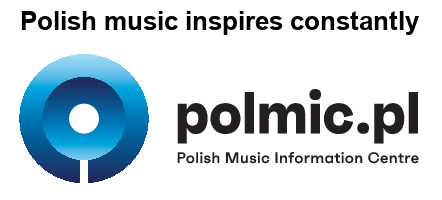Zielińska Lidia
-
composer
composer, b. 9th October 1953 in Poznań. In 1978 she graduated from the State Higher School of Music in Poznań, where she had studied composition with Andrzej Koszewski. She worked as a violinist in the Poznań Philharmonic Orchestra and Chamber Orchestra directed by Agnieszka Duczmal. She participated in many composition workshops and seminars in Poland, the Netherlands, France and Switzerland. She has also been a guest lecturer at composition courses in Poland, Belarus, Chile, France, the Netherlands, Japan, Canada, Moldova, Germany, Switzerland and Sweden. She has collaborated with visual and experimental film and theatre artists (Jan Berdyszak, Ted Brandsen, Izabella Gustowska, Aleksandra Korejwo, Wojciech Müller, Lech Raczak, Roland Topor, Ewa Wycichowska and others).
She was awarded in numerous composition competitions in Poland and abroad; in 1978 she received the 2nd prize in the Artur Malawski Competition for Litany for string quartet (1978), in 1979 – the 3rd prize in the National Competition for Composers in Białystok for Stabile, mobile a passacaglia for 7 performers (1979), an honourable mention in the Polish Composers’ Union Competition for Young Composers for Polyethylene Diptych for orchestra (1979) and the 1st prize as well as critics’ award in the International Competition for Composers “Jeunesses Musicales” in Belgrade for Violin Concerto (1979), in 1980 – the 2nd prize in the National Competition for Composers in Łańcut for Six Pieces for string quartet (1979), in 1981 – the 1st prize in the International Competition for Female Composers in Mannheim for Assacaglia for 5 instrumentalists (1980), in 1982 – an honourable mention in the Karol Szymanowski Competition for the tragicomedy Mrs. Koch (1981) and in 1983 – the 1st prize in the Max Deutsch International Composition Competition in Paris for Farewell to Toorop for orchestra (1981).
In 1993/94 she participated in the EuroMusikTheater project which culminated in a premiere of Zeitschlingen (1994) in Stuttgart, and a year later – in DonauBallet that led to the premiere of Venture Unknown (1995) during Holland Dance Festival. In 1995/96 she was the composer-in-residence at the Electronic Music Studio in Stockholm. For the work Like These White Mice (1996) composed during that period she received a prize at the International Electroacoustic Music Competition in Bourges in 1997. She is also a recipient of emsPrize in Stockholm (2001) for Just too many words for tape (2001). In 2008 her composition Conrad’s Seven Islands for electronics and 10 amplified instruments (2007) was nominated for OPUS Public Media Award. In 2015, Lidia Zielińska was nominated for Golden Nica for „Visionary Pioneers of Media Art" award (Prix Ars Electronica, Linz, Austria).
Lidia Zielińska’s works have been performed at many festivals in several countries in Europe, Asia, North and South America, by such performers and ensembles as Krzysztof Bąkowski, Daniel Gazon, Marta Klimasara, Jan Krenz, Claire Larcher, Jerzy Maksymiuk, Alexandre Myrat, Jan Pilch, Daniel Stabrawa, Terje Thiwang, Pomone Tortelier, Francoise Vanhecke, Antoni Wit, Anna Zielińska, Joos Zwaanenburg, Ensemble InterContemporain, De Ereprijs, Notabu ensemble neue musik, Ensemble Ars Nova, Music Centrum, Amadeus Chamber Orchestra of the Polish Radio, New Music Orchestra, Schola Cantorum Gedanensis, Polish Dance Theatre and others.
She has received commissions from the Polish Radio, the “Solidarity” trade union, the Eighth Day Theatre, Holland Dance Festival, Euro-Musik-Theater in Stuttgart, De Ereprijs ensemble, Radio Sweden, the Ministry of Culture of Baden-Württemberg and the “Warsaw Autumn” Festival. She has worked at the electronic music studio of the State Higher School of Music in Cracow, the Polish Radio Experimental Music Studio in Warsaw, the IPEM/BRT in Ghent, EMS in Stockholm, ZKM in Karlsruhe, Experimentalstudio des SWR in Freiburg and others.
She has published many texts (on Polish contemporary music, electroacoustic music, the history of experimental music, sound ecology and Japanese traditional music) and lectured at several universities in Europe, Asia, Australia and New Zealand, Manggha Centre of Japanese Art and Technology in Cracow, the Centre for Contemporary Art. – Ujazdowski Castle in Warsaw, the annual ISEA and WFAR conferences and numerous academic sessions in Poland and abroad. She has conducted seminars, workshops and summer courses in Poland, Belarus, Chile, France, the Netherlands, Japan, Canada, Moldova, Germany, Sweden and Switzerland. She is a juror, curator, expert and consultant of various musical, intermedia and educational activities in different European countries, including Eastern Europe and the European Union countries.
Lidia Zielińska is a professor of composition and the director of the Electroacoustic Music Studio at the Academy of Music in Poznań. In 1992-93 she worked as a lecturer at the Music Academy in Wrocław. In 1989-92 and since 2001 she taught sonology at the Academy of Fine Arts in Poznań.
She was a co-founder of the musical quarterly “Monochord, de musica acta, studia et commentarii” (1993), “Brevis” Music Publishers (1990), “Child and Sound” Foundation (1991), “Warsaw Autumn Friends” Foundation (1998), “Zachęta” Wielkopolska Society for Fine Arts (2004) and PSeME – the Polish Society for Electroacoustic Music (2005).
For many years she was a member of the Repertoire Committee of the “Warsaw Autumn” Festival (1989–92 and 1996–2005). She held the position of artistic director of the “Poznań Music Spring” Contemporary Music Festival (1989-92) and the “Child and Sound” International Festival in Poznań (1993-95). She was also a board member of the Polish Society for Contemporary Music (1981-92), Board member of the Poznań section of the Polish Composers’ Union (1983-93, 1999-2001) and managing board member of the Polish Composers’ Union (1989-91 and since 2001), a vice-president (since 2007) of PSeME – the Polish Society for Electroacoustic Music, a member of the programme committee of the ISCM World Music Days in 1992 in Warsaw, Polish-German “Radio_Copernicus” and others.
In 2013, Polish Music Information Centre POLMIC, in co-operation with Polish Radio SA and thanks to the generous support of the Ministry of Culture and National Heritage, released an audio CD dedicated to her music, as part of the the Polish Music Today – Portraits of Contemporary Polish Composers series.
In 2007 Lidia Zielińska received the Polish Composers’ Union Award for “outstanding and comprehensive achievements in composing”. In 2015, she was awarded by the Minister of Culture and National Heritage of the Polish Republic the Silver Medal for Merit to Culture - Gloria Artis.
The Composer's website: https://lidiazielinska.wordpress.com/
Contact
e-mail:
Creation
Lidia Zielińska is one of the most interesting contemporary Polish composers. Her creative approach has been marked by continuous pursuit of a wide range of artistic interests. In her work she has focused on electroacoustic music and multimedia art. After completing her education in classical composition, she participated in many courses, during which she discovered new methods of working. She attended courses in Breukelen ("Musicultura"), Amsterdam ("Gaudeamus" Foundation), Rydzyń and Wzdów (the Polish Society for Contemporary Music). She has also collaborated with theatre, experimental film and visual artists. She took part in "EuroMusikTheater" project in Stuttgart. As a composer-in-residence she has worked at the Electronic Music Studio in Stockholm, the IPEM/BRT Studio of Electronic Music in Ghent and the Institute de la Musique Electroacoustique in Bourges. She has given many lectures on electroacoustic music and multimedia and has been invited by several universities in Europe, Canada, Japan, Chile and Korea. Her key interests focus around “sound ecology”.
Lidia Zielińska’s explorations in the fields of electroacoustic and multimedia art resulted in numerous compositions which use electronics, computers and visual elements. Her “classical” works for tape or computer include: Polish Dances for tape, after Father Baka (1986), Short piece for flute and computer or tape (1992), Like These White Mice for tape (1996), Expandata for snare drum and tape (1997), Ballada sopra Ballata for tape (1997) and Just Too Many Words for tape (2001). Audiovisual compositions: Artificial Cult for tape, video, neon signs and visual objects [with Wojciech Olesiak] (1985), Heldenleben. Overheard, Spied On for audio tape, video tape and shadowgraph (1986), Kaleidoscope-Passacaglia for children for percussion, slides and clapping hands (1987), Motetus universalis, installation (1997), A Sketch Drawn from Nature, multimedia performance (2002), From a Sketchbook 2, multimedia performance (2003) and others.
Kaleidoscope-Passacaglia belongs to the important group of Lidia Zielińska’s compositions dedicated to children. Other ambitious projects of this kind include: the already mentioned Kaleidoscope-Passacaglia for children for percussion, slides and clapping hands (1987), Sound Museum - ”live” installation for children (1988) and Soaked Ground Music with children audience, narrator, conductor and tape (1993). She has also created a number of performances: The Same (1988), Voices (with Izabella Gustowska – 1992) and a performance given during the “Audio Art” Festival in the Ujazdowski Castle in Warsaw in 2002. This outline of Lidia Zielińska’s extraordinary output is of necessity incomplete. The genres listed above give her a place among Polish contemporary composers for the modern media; however, the artist has also composed many traditional works for standard instruments, such as the Violin Concerto (1979 – the 1st prize and critics’ award in the International Competition “Jeunesses Musicales” in Belgrade), String Quartet (1988) or Zoom for violin and orchestra (2000).
Compositions
- Listen, Joe - monodrama for mime, tape and orchestra (1978)
- Litany for string quartet (1979)
- Violin Concerto (1979)
- Two Dances for strings (1981)
- Epitaph in memoriam of the Poznań June 1956 for orchestra (1981)
- Mrs. Koch - tragicomedy in 1 act for solo voices, tape recorders, vocal and instrumental ensembles (1981)
- Farewell to Toorop for orchestra (1981)
- Treaty for oboe quartet (1982)
- Cascando for actor and double mixed choir (1983-91)
- Gagaku Lullaby for double bass (1984)
- Sonnet about the Tatra Mountains for 4 musicians (1985)
- Artificial Cult for tape, video, neon signs and visual objects [with Wojciech Olesiak] (1985)
- Fiction for orchestra (1986)
- Glossa for viola or violin (1986)
- Heldenleben. Overheard, Spied On for audio tape, video tape and shadowgraph (1986)
- Pleonasmus for oboe, violin and string orchestra (1986)
- Polish Dances for tape, after Father Baka (1986)
- AKO’s First Journey - animated film [with Aleksandra Korejwo] (1986)
- Concrete Music for choir and orchestra (1987)
- Feature Piece for saxophone and tape (1987)
- Kaleidoscope-Passacaglia for children for percussion, slides and clapping hands (1987)
- String Quartet (1988)
- Piece about Everything for percussion and children audience (1988)
- Descendent for harpsichord or piano (1988)
- Huit heures de la vie des femmes - music theatre for 9 performers (1988)
- Little Atrophic Symphony for orchestra (1988)
- Music for the Holy Week for mixed choir and percussion (1988)
- The Same, performance (1988)
- Sound Museum - ”live” installation for children (1988)
- Musica humana or How Symphonies Are Born [version I] - radio piece (1989)
- Toccata for percussion orchestra (1989)
- Two Poods, spatial piece for 5 performers (1989)
- In the Field - minispectacle (1990)
- Cascando [chamber version] for actor and double mixed choir (1991)
- Jacquard for 14 musicians (1991)
- Graphic II for 10 instruments and live electronics (1991)
- Voices - performance [with Izabella Gustowska] (1992)
- Fago for bassoon, double bass, accordion and electronic keyboard (1992)
- Short piece for flute and computer or tape (1992)
- Soundiness - music theatre for children (1993)
- Soaked Ground Music with child audience, narrator, conductor and tape (1993)
- Zeitschlingen - sound spectacle (1994)
- Section TOGO for male choir and piano (1995)
- Venture Unknown - ballet (1995)
- Like These White Mice - radio piece (1996)
- La Vetrata for youth string orchestra (1996)
- Ballada sopra Ballata for tape (1997)
- Expandata for snare drum and tape (1997)
- Motetus universalis - installation (1997)
- Percussionata for 40-60 percussionists (1998)
- You Know It, Then Listen... - hörspiel based on Julian Tuwim’s “Locomotive” (1998)
- Atlas of Polish Sound Symbols - radio piece (2000)
- Zoom for violin and orchestra (2000)
- Just too many words for tape (2001)
- Grain to Grain for 13 instruments (2002)
- A Sketch Drawn from Nature - multimedia performance (2002)
- From a Sketchbook 2 - multimedia performance (2003)
- Nobody is Perfect for electronic sounds and 17 instruments (2004)
- Rhapsody for violin and electronic sounds (2004)
- dumchrzquii for tape (2004)
- The Cases of Mr von K. (Die Fälle des Herrn von K.) - ballet-performance (2005)
- Lunches in Rejowiec 1965-1565 for tape (2006)
- Everything Has Happened Before - audiovisual installation (2006)
- From the Garden of Science for choir and electronics to the text from Ecclesiastes (2006)
- Open Your Ears! Open Your Eyes! - audiovisual miniature for children (2006)
- Conrad’s Seven Islands for electronics and 10 amplified instruments (2007)
- The Eighth Island for CD or computer [multi-channel] (2008)
- Beethoven’s Cook for CD (2009)
- To Have a Title for the Piece... for clarinet, electric guitar and piano (2009)
- Rust for 5 or 6 instruments and CD (2010)
- Canción triste for violin and CD (2010)
- In the Rear for computer [ambisonics] (2010)
- Backstage Pass for computer [ambisonics or multi-channel] (2010)
- Musical Landscapes – Yesterday, Today, Tomorrow, multimedia concert for children (2011)
- Melodrama for orchestra (2011)
- X3 for 14 instruments (2011)
- Years for orchestra (2011)
- Aphasia for tenor saxophone and CD (2012)
- Ukiyo for 19 instruments (2012)
- Insectarium for CD, music for a visual exhibition (2012)
- 53 Breaths for glissando flute, 8-channel tape and live electronics (2013)
- X-3m for ensemble (2013)
- Slices of Music, installation (2013)
- Lutosławski DIY, installation (2013)
- Looks Chinese, sound Polish, octophonic installation (2013)
- Polish sonorities, octophonic installation (2013)
- Missed Link, sound performance for 8-channel tape, traditional singing, viola, hurdy-gurdy, percussion and live electronics (2014)
- Do Cna for 10 Chinese instruments (2015)
- Sinfonia concertante for small sound devices, small percussion and large orchestra (2015)
- Radomskie Pory Roku for youth group, two flutes, string orchestra and electronics (2015)
- Palindrome for two melodic instruments and CD (2015)
- Threesome for 12 instruments and live electronics and optional video (2015-16)
- Insektarion for 8-channel tape (2016)
- Three Hundred for vocal ensemble with soloists, handheld instruments, 8-channel tape and live electronics (2016-2017)
Publications
Zielińska Lidia, Przewodnik po twórczości Andrzeja Koszewskiego, Brevis, Poznań 1993











